Growing raspberries can be an incredibly rewarding experience, yielding delicious, juicy fruit that bursts with flavor. However, achieving a consistent bumper crop year after year requires diligent care and the right know-how. This article aims to provide you with a comprehensive guide to using organic fertilizers to nurture your raspberry plants, ensuring they thrive and produce an abundance of fruit. We will explore the benefits of organic plant food, the best practices for fertilizing your raspberry bushes, and tips for maintaining healthy soil. Whether you’re a seasoned gardener or just starting out, these insights will help you cultivate robust raspberry plants that yield plentiful harvests season after season.
What is the Best Raspberry Fertilizer?
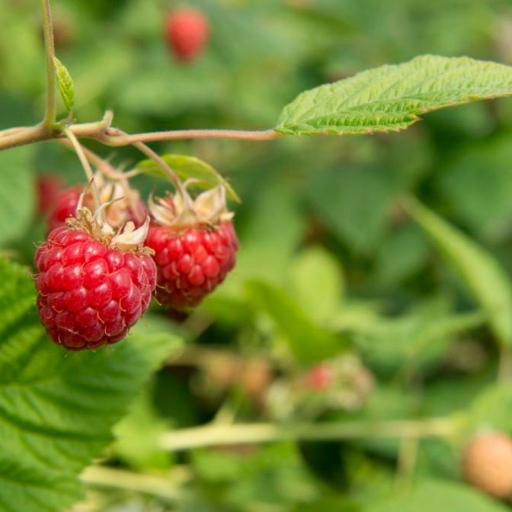
Understanding the Importance of Organic Fertilizer
Organic manure is very important for your raspberry plants. Unlike synthetic fertilizers, organic inputs are a slow-release source of nutrients that improve soil structure and promote beneficial microbial activity. This will in turn lead to enhanced root development, good water retention ability and resistance to pests and diseases. Moreover, these fertilizers are safe to use as they do not pollute soil or water. By using organic plant food, you will ensure that there is a balanced supply of necessary nutrients to your raspberries giving you more even production from year to year.
Comparison Between Granular and Water-Soluble Fertilizers
When it comes to choosing between granular and water-soluble fertilizers for your raspberry plants, it’s important to know their characteristics and advantages.
Granular Fertilizers
- Release Rate: Granular fertilizers take a long time before they release their nutritional components which is good for maintaining healthy soils.
- Application: They are usually applied on the soil surface around the plants or mixed with the soil for better integration.
- Nutrient Consistency: Since they release slowly into the ground, granules guarantee consistent nutrient provision thus preventing nutrient burnouts or leaching hazards which may occur otherwise.
- Ease of Use: Granules are easily handled when applying them compared with soluble ones that demand frequent reapplication.
- Cost: In general terms, this type is cheaper than liquid one especially if used in big farm.
Technical Parameters:
- Nutrient Concentration : Usually given as N-P-K (Nitrogen-Phosphorus-Potassium) ratios like 10-10-10 meant to provide well-balanced nutrients.
- Release Mechanism: Coated or slow-release formulas control how fast plants access nutrients over several months only from coated or slow releasing brands respectively.
Water-Soluble Fertilizers
- Release Rate: These types of fertilizers give immediate nutrition opportunities hence suitable in situations where nutrition deficiencies need to be corrected quickly.
- Application: They are put in water which is used as a direct soil drench, or sprayed on the leaves to favor fast absorption of nutrients.
- Nutrient Control: Water-soluble fertilizers allow for accurate timing and concentration needed for specific plant problems.
- Ease of Use: There should be frequent applications done with caution so that excess fertilizer does not reach roots of plants through drainage from the pots where they are planted.
- Cost: The most expensive per application but best for targeted feeding.
Technical Parameters:
- Nutrient Concentration: These have rather high N-P-K ratios such as 20-20-20 that implies availability of nutrients in the medium after a short span of time.
- Solubility: Should be able to dissolve completely when applied in order to distribute uniformly on the surface alongside others soluble compounds.
Both granular and water-soluble fertilizers are good for raspberries depending on their unique requirements and your approach towards gardening practices.
Choosing the Best Fertilizer for Raspberries
To choose the best fertilizer for raspberries, you must consider both growth stages and how much nutrition is required by plants. For recently established raspberry plants, an example of such balanced granulated manure would be 10-10-10 which supplies necessary micro-elements slowly encouraging root formation as well as steady plant development. Established raspberry plants will require more nitrogen in support of fruiting; it’s better thus to go with either a balanced slow-release like 20-20-20 or just dissolve Miracle-Gro into irrigation water. Water-soluble fertilizers provide instant nutrient delivery which helps during fast growth stage or correction of nutrition deficiency. Besides this, organic matter such as compost or well rotted manure may improve soil structure and raise its nutrient content making it healthier place for growing raspberries. Therefore routine soil tests will help determine what amount is exactly needed without over-fertilization ensuring good crop of raspberries.
How Often Should You Fertilize Your Raspberry Plant?
Signs That Your Raspberry Bush May Require Feeding
It is very important to recognize when your raspberry bush needs feeding in order to maintain its health and productivity. Some common signs that indicate fertilization of your raspberry plants may be needed are as follows:
- Yellow Leaves: Often yellowing leaves signify nutrient deficiencies, especially an insufficiency of nitrogen that is critical for good foliage.
- Poor Growth: Dwarfed or retarded growth can be the result of insufficient nutrients for plant development.
- Reduced Yield: A fall in the number or quality of fruits produced could mean the raspberry bush is not getting enough food.
- Weak Stems: Less supply from nutrients may result into weaker and narrower stems liable to withstand lower fruit loads.
- Leaf Fall: When leaves start dropping off too soon, they might signal some nutrient imbalances or deficiencies.
By checking for these signs on your raspberry plants, you will be able to detect this additional fertilization time which ensures strong growth with greater fruit production. It also helps in keeping general condition of soil health where regular soil test should be observed with a consistent fertilizing schedule among others.
The Best Time To Fertilize Raspberries In Early Spring
For best results when fertilizing raspberry plants during early spring, it’s important that you apply at a specific moment. According to most top sources, raspberries should be fed at their onset of spring growth. This usually coincide with the emergence for new green shoots from the ground and occurs around March or April depending on your local climate. The application of fertilizer during this period makes nutrients available for supporting vigorous early growth and future fruiting canes. Use balanced fertilizer with slow release mechanism so that it can continue nourishing steadily within growing season.
Maintaining Nutrition Levels Year-Round
Following a few practices will help ensure year-round steady nutrition supply to your raspberry plants. Start with a balanced slow-release fertilizer applied early in the spring for crucial nutrients during initial stages of their growth. Support plants with organic mulch like compost or well-rotted manure as they go through the growing season to hold enough soil moisture and add extra nutrients. Regular soil testing is recommended for checking nutrient levels and adjusting fertilizing strategies thus necessary. Lightly apply compost in autumn so that it can restore fertility of the soil before next crop year begins. These measures, extracted from reliable resources such as gardening books and agricultural extensions, will maintain your raspberry plants’ health and productivity throughout the year.
What Essential Nutrients Do Raspberries Need?
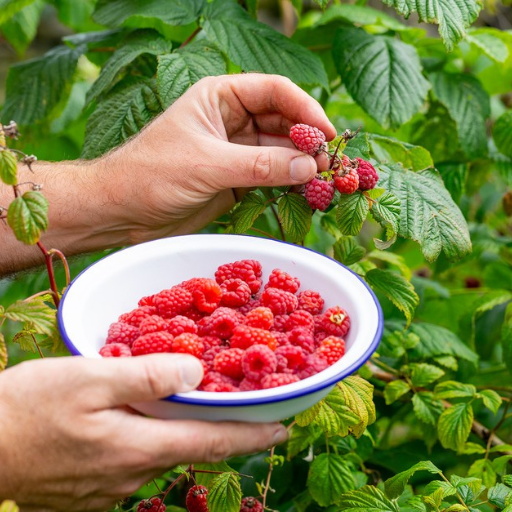
The Nitrogen Role in the Raspberry Growth
For growth and development of raspberry plants, Nitrogen is critically important. It plays a significant role in stimulating a robust vegetative growth that is essential for healthy canes and an abundant harvest. Nitrogen is one of the key elements in chlorophyll, the molecule which facilitates photosynthesis hence enabling plants to use light energy to produce food. The presence of enough nitrogen supports lush green foliage which contributes to general health of plant and productivity. Nevertheless, it’s a delicate balance—too much nitrogen can lead to excessive leaf production instead of fruit while too little will result into stunted growth and yellowing leaves. The recommendation is thus made for optimal results and therefore one should apply balanced slow-release fertilizer early in spring then supplement with soil tests frequently.
Importance of Phosphorus and Potassium
Both phosphorus and potassium are equally important for the good health and high productivity of raspberry plants. For example, phosphorus promotes root development as well as energy transfer within the plant thus leading to fruitful flowering plus fruit set. When there’s not enough phosphorous, roots become weakly developed leading to poorly grown fruits. On contrast, potassium plays an essential role in overall plant fitness since it helps against diseases as well as improves water regulation thereby increasing size as well as quality of fruits produced by this crop type. There should be adequate supply of potassium during fruiting stage when berries should be plump enough to make them juicy.This will ensure that your raspberry receives these two nutrients from the soils;bone meal for phosphates,and potash or wood ash (based on soil test recommendations) ,the latter being used here for its content.In this way,you will have increased yield because you are starting your process at the production level leadingto healthier living organisms.
Organic Matter Benefits Raspberries
There are many advantages that come with incorporation organic matter into soils when growing raspberries.One such advantage is that it improves the soil structure. Organic matter makes the soil more friable, hence good aeration and root penetration is possible thus supporting healthy root development. Additionally, organic matter increases water holding capacity of soils reducing irrigation frequency and ensuring continuous availability of moisture even in times of drought.
Organic material also acts as slow-release providers of essential elements. As it decays, some nitrogen, phosphorous, potassium and other trace elements which are required by raspberries for growth and fruit development are slowly being released to the surrounding soi.Like so many things related to our planet’s health today,this organic carbon not only helps sustain balanced ecosystems but also promotes soil fertility.By increasing organic matter, composting enriches both nutrients content as well as general healthiness and resistance of soils leadingto more abundant high-quality raspberry harvests.
When used as organic amendments, compost,wel-rotted manure or leaf mold improve nutrient status while generally enhancing soil condition thus leading to high quantity harvests characterized by excellent quality of fruits.
What Types of Organic Fertilizers are Best for Raspberries?
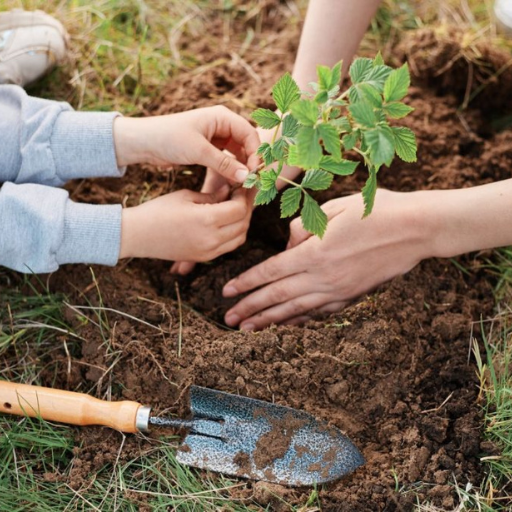
Using Compost or Well-Rotted Manure
It is therefore recommended that compost and well-rotted manure be used when fertilizing raspberry plants because of their richness in nutrients that help to improve soil health.
- Compost: This type of organic fertilizer is made from decomposed plant material as well as kitchen waste. Compost breaks up the structure of the ground, has the capacity to retain more moisture, and provides a slowly released source of essential nutrients such as nitrogen, phosphorous and potassium. Around Raspberry plants, for example put a layer or two of compost in spring season to boost growth as well as fruit production.
- Well-Rotted Manure: Aged manure from animals like horses, cows or chicken is referred to as well rotted manure. It contains high levels of organic matter and nutrition that gradually enriches soils while promoting strong root systems. spread a 2-3 inch layer of well-rotted manure around raspberries in early spring ensuring it is worked into the soil so as nitrogen does not escape.
Therefore, both compost and well-rotted manure encourage beneficial microorganisms present in soil hence supporting thriving ecosystems. These microorganisms play an important role in decomposing organic matter thereby making nutrients available for plants since they also help suppress soil borne diseases. Incorporating these organic fertilizers will result into healthier plants with higher yields during raspberry harvesting.
Benefits of Blood Meal and Fertilizer Spikes
- Blood Meal: Dried animal blood typically from cattle forms this highly nitrogenous organic fertilizer known as blood meal. Consequently, this powerful fertilizer induces rapid development which results into vigorous foliage on beds containing raspberries. On the other hand when applied early in spring time it will provide quick source of nitrogen which is needed by photosynthesis and formation of green leafy tissues; moreover it can also deter mole rats along with deer from invading your garden.
- Fertilizer Spikes: These are pre-measured compressed forms of fertilizers that are introduced into the soil near the root areas of plants. They provide steady, slow-release supplies of essential nutrients which ensures consistency in growth and fruit production during the entire season. The main advantage of fertilizer spikes is their simplicity making them easy to use hence reducing frequent application needs; their use also minimizes over-fertilization and nutrient runoff.
Therefore, blood meal and fertilizer spikes offer a balanced approach to raspberry fertilization by meeting short-term and long-term nutrient requirements for the plants. This will encourage a vibrant development as well as rich Raspberry harvests while maintaining healthy soils and sustainability.
Effectiveness of Slow-Release Fertilizers
Slow-release fertilizers are good at providing consistent nutrient supply over an extended period to raspberry plants. Unlike conventional fertilizers that release nutrients rapidly which require frequent applications, slow-release ones decompose gradually thus ensuring that any plant will receive enough food throughout its growing cycle. This steady supply helps produce strong roots, lush foliage and bountiful yields.
Some major advantages highlighted on top agricultural websites include; reduced leaching risk, minimized wastage, lower environmental impact among others. By steadily delivering nutrients, slow-release formulations help prevent the sudden nutrient spikes that can stress plants and lead to uneven growth. Additionally they require fewer applications relieving gardeners the burden they have to go through during application time.
To summarize, slow-release fertilizers are especially useful in growing raspberries because they cause continuous healthy growth thereby improving soil health implying more sustainable gardening practices.
How to Apply Fertilizer to Raspberry Plants?
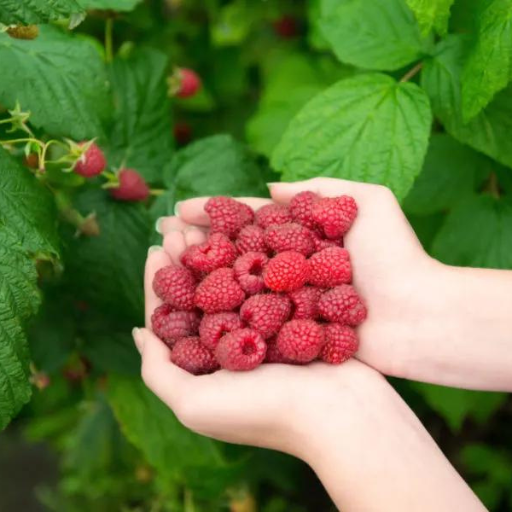
Proper Techniques for Granular Fertilizer Application
When applying granular fertilizer to raspberry plants, I start by ensuring the soil is moist but not waterlogged. I evenly spread the granules around the base of each plant, taking care not to place them too close to the stems. It’s essential to follow the recommended dosage on the fertilizer packaging to avoid over-fertilizing, which can harm the plants. After spreading the granules, I gently work the fertilizer into the top few inches of soil using a rake or hand cultivator. Finally, I make sure to water the area thoroughly to help dissolve the granules and promote nutrient absorption. This method helps provide a steady nutrient supply, encouraging healthy growth and abundant fruit production.
Ensuring Soil pH and Proper Water Balance
Maintaining the correct soil pH and water balance is crucial for the health of raspberry plants. Firstly, I test the soil pH using a reliable soil test kit and aim for a pH between 5.5 and 6.5, as this range is optimal for nutrient uptake. If the pH is too low, I add lime to raise it; if it’s too high, I incorporate sulfur to lower it. Regarding watering, I ensure that raspberry plants receive about 1 to 1.5 inches of water per week, either through rainfall or supplemental irrigation. It’s important to water at the base of the plants and avoid wetting the foliage to reduce the risk of fungal diseases. Mulching around the plants helps retain soil moisture and maintain a consistent moisture level, preventing both waterlogging and drought stress. This approach promotes healthy root development and supports vigorous growth and fruit production.
Keys to Plant Care for Established Raspberries
Caring for established raspberry plants involves a few key practices to ensure they remain healthy and productive. Firstly, I regularly prune the canes to remove any dead or diseased wood and to thin out the plants, which boosts air circulation and prevents overcrowding. This not only enhances fruit quality but also reduces the risk of fungal infections. Next, I continuously monitor for pests and diseases, taking prompt action if I notice any signs of trouble. Using organic pest control methods and maintaining good sanitation helps keep the plants thriving. Additionally, I provide support for the canes using stakes or trellises, which helps the plants grow upright and makes harvesting easier. Regularly applying mulch around the base of the plants conserves moisture, suppresses weeds, and maintains a stable soil temperature. By following these care practices, I ensure that my raspberry plants remain vigorous and yield abundant, delicious fruit year after year.
Frequently Asked Questions (FAQs)
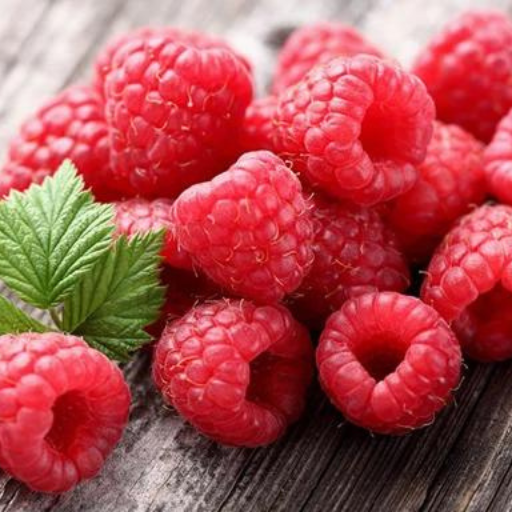
Q: How do I use organic plant fertilizer to enhance growth in raspberry plants?
A: Raspberry plant organic manure is a good option for boosting strong growth in raspberry bushes. Mix it with water and apply it on the soil before planting so that when the raspberry plants need them they will find nutrients.
Q: What is the best fertilizer for raspberry bushes?
A: The most suitable fertilizer for raspberry bushes is 10-10-10, which contains well-balanced amounts of nitrogen, phosphorous and potassium (NPK) necessary for better development.
Q: How often should I be feeding raspberry bushes with organic plant food?
A: Raspberry plants are heavy feeders and require regular fertilizing. Recommended amount of organic plant food per month given to raspberries boost root and flower production during their growing season.
Q: When should I apply fertilizer to raspberries for new growth?
A: The best time to fertilize for new growth is early spring when the raspberry plants begin to show signs of active growth. Hence this supports rapid initial growth and a productive harvest later on.
Q: Is there a specific NPK ratio I should look for in organic raspberry fertilizers?
A: Yes, a balanced NPK ratio of 10-10-10 is ideal when growing raspberries. This guarantees equal amount of nitrogen, phosphorous and potassium required for normal plant development.
Q: Can I use earth all-natural fertilizers for growing raspberries in pots?
A: Earth all-natural fertilizers are an excellent choice if you want to grow raspberries in pots. They can be mixed with water and applied directly into potting soil without fear of chemical build-up but offering important nutrients needed by these fruits.






